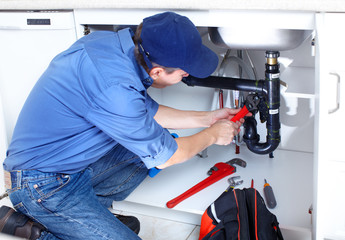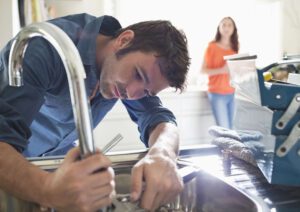Plumbing systems serve several purposes, including delivering clean water and removing waste. These systems require regular maintenance to prevent leaks and ensure they function correctly. Regulations set by the EPA are crucial to ensuring that plumbing systems meet safety and environmental standards.

Clogged drains can be detrimental to health, causing respiratory problems and aggravating existing ones. To avoid clogged drains, prevent them from forming in the first place by limiting what goes down your drains. Visit https://www.plumbing-express.com/to learn more.
Plumbing is a complex system of pipes and fixtures that deliver potable water and remove wastewater. It is essential for ensuring that water is available for everyday uses and that waste is removed in a safe and efficient manner. Plumbing is a skilled trade that requires knowledge of a variety of concepts, including water supply, drainage, and venting. It also involves adherence to building codes and regulations.
A plumbing system consists of pipes that transport water, fixtures that deliver and receive water, and appliances that connect to the pipes. It also includes a venting system that prevents the buildup of sewer gases. The plumbing system is a vital part of any home or business, and proper maintenance is essential to ensure that it functions correctly.
In residential buildings, the main plumbing systems are the water supply and drain-waste-vent (DWV) systems. The water supply line delivers freshwater from the municipal or private water supply to the faucets and fixtures in your home. These include sinks, bathtubs, showers, and toilets. Modern fixtures often incorporate water-saving features to promote conservation.
The piping in a plumbing system is made of different materials, depending on the specific needs of the structure. Copper pipes are known for their durability and longevity, while PVC pipes are lightweight and corrosion-resistant. These pipes are connected to valves that control the flow of water. Valves can be shut off quickly in case of an emergency, and they can also regulate the flow of water to a fixture.
Plumbing fixtures are the end-points of a plumbing system, connecting to the water supply and drainage systems. They are often the most visible components of a plumbing system, and they can be found in kitchens, bathrooms, and other rooms. While many homeowners focus on the functionality and durability of plumbing fixtures, it is important to consider their aesthetic appeal as well. Choosing fixtures that complement the overall design of your home can create a cohesive, attractive look.
It is regulated by the EPA
The EPA regulates plumbing through a series of federal and state laws, as well as local codes. These regulations ensure the safety and functionality of plumbing systems, and protect the environment by reducing waste and energy consumption. Plumbers must obtain permits and adhere to strict inspection requirements to meet these standards. These inspections help ensure the safety of the public and the longevity of plumbing systems.
The EPA’s lead free rule requires that all pipes, pipe fittings, and plumbing fixtures in contact with potable water must be lead-free or contain no more than 0.25% lead by weighted average. This is a significant reduction from the previous standard of 8%. However, a number of products have been exempted from the EPA’s lead free rule, including non-potable plumbing, plumbing parts for fire hydrants, and plumbing parts used for industrial processing, irrigation, or outdoor watering.
In addition, the EPA conducts research on contaminant persistence in premise plumbing systems to identify possible sources of contamination and provide guidance for home and building owners. This research includes assessing contaminant levels in drinking water at the point of use and monitoring plumbing components. The EPA also works with local water utilities to develop and implement contaminant-decontamination strategies for contaminated drinking water.
A well-maintained plumbing system is essential for your health and hygiene. It brings fresh, clean water into your home and removes wastewater, keeping your environment hygienic and safe. However, faulty plumbing can cause a wide range of health issues, from mold to sewage backups. This is why it’s important to hire a plumber with the proper expertise and experience. McCarthy Plumbing Group has a proven track record of helping property owners and managers address environmental plumbing defects and hazards. We can advise you on a full range of remedial solutions, from stormwater management upgrades to groundwater contamination remediation in Melbourne.
It is a technology
Plumbing is a vital technology that provides access to clean water and sewage disposal. It is also an essential part of building design, ensuring the safety and functionality of indoor environments. As such, it is important for plumbers to keep abreast of new innovations in the field. These technologies can help improve plumbing efficiency, reduce energy consumption, and promote sustainability.
Plumbing systems rely on a variety of materials, each chosen for its specific properties and applications. Copper pipes, for example, are renowned for their longevity and resistance to heat and corrosion. PVC and PEX pipes, on the other hand, offer cost-effective alternatives for drain lines and vent stacks. These new materials are gaining popularity thanks to their flexibility and durability. They also resist scale and chlorine better than traditional metals.
Many plumbing technologies focus on promoting sustainability and environmental conservation. This includes low flow fixtures and appliances, rainwater harvesting systems, greywater recycling methods, and more. These eco-friendly solutions not only benefit the environment, but can also reduce utility bills and energy costs for homeowners.
Advanced plumbing technologies can also make maintenance and repair tasks easier and more effective. For example, plumbers can use sewer camera inspection to locate broken pipes and find out what’s causing blockages. This saves time and money by avoiding the need to dig up the entire system. In addition, plumbing technology can assist with identifying leaks by listening for acoustic signals.
In addition to enhancing efficiency and sustainability, plumbing technology helps ensure a safe working environment for workers. It also helps identify potential problems before they become more serious. This is especially useful for plumbers who work in high-rise buildings or with complex piping configurations.
It is a science
Plumbing is a complex system that requires a knowledge of several scientific principles to function properly. It’s not just about gravity and water pressure; it’s also about biology, chemistry, fluid mechanics, and even thermodynamics. While these concepts may seem basic, they make the complex dance of plumbing possible. Understanding the science behind your plumbing can help you appreciate this essential technology.
The earliest plumbing systems developed during ancient civilizations, as they sought to manage water for drinking and bathing. The Romans, for example, were renowned for their sophisticated aqueducts and plumbing infrastructure that allowed them to provide public bathing and waste management. They also designed innovative sanitation systems that incorporated advanced plumbing techniques.
Modern plumbing systems rely on a variety of materials, from copper pipes to PVC, each chosen for its unique properties and purposes. For instance, copper is favored for its longevity and resistance to heat. Meanwhile, PVC is a durable plastic that is lightweight and cost-effective.
As part of the plumbing design process, engineers use Hunter’s curves to estimate how much water will be used by a particular building. They also consider the size and shape of pipes, valves, and fixtures when determining the maximum flow rate. This helps them minimize problems like water hammer, which is caused by rapid changes in pressure.
Although it’s easy to take plumbing for granted, it is essential for a healthy life. We need to drink clean water to stay hydrated, and we need to bathe frequently to maintain good hygiene. Both of these necessities depend on plumbing, and a plumber’s services are crucial for keeping them functioning. The next time you turn on the faucet or flush a toilet, remember that these conveniences are a testament to human ingenuity and the intricate dance of scientific principles that keep our systems running.
It is a profession
Plumbing is a complex profession that involves the installation, repair, and maintenance of pipes, fixtures, and appliances. It also involves adhering to building codes and standards to ensure safety and functionality. The Environmental Protection Agency plays a critical role in this area by setting and enforcing water quality standards, promoting sustainability, and preventing backflow contamination of drinking water supplies.
While some people might think that anyone can get a magnet with a plumber’s name on it and start working, it’s important to realize that it takes years of training and experience to become a certified plumber. This process starts with a vocational or trade school program, which offers in-class education and hands-on skills training. Then, students enter a formal apprenticeship program, which typically lasts a few years. Apprentices work under experienced plumbers and receive on-the-job training while learning the trade. They can then progress to journeymen and ultimately become master plumbers.
Besides repairing existing pipes, plumbers also work on new construction projects. They interpret blueprints and building plans to plan and lay out piping systems. They also install appliances and fixtures such as sinks, toilets, showers, and water heaters. Other duties include testing the water’s flow rate and ensuring that backflow prevention devices are in place.
Plumbing professionals usually specialize in residential or commercial work. They may also choose to focus on specific aspects of the field, such as gas fitting or roofing. A plumber may choose to work as an independent contractor or join a union, which can provide job security and benefits like health insurance and sick leave. In addition, some plumbers work for wholesalers that sell pipes and other materials or as representatives for manufacturers.

